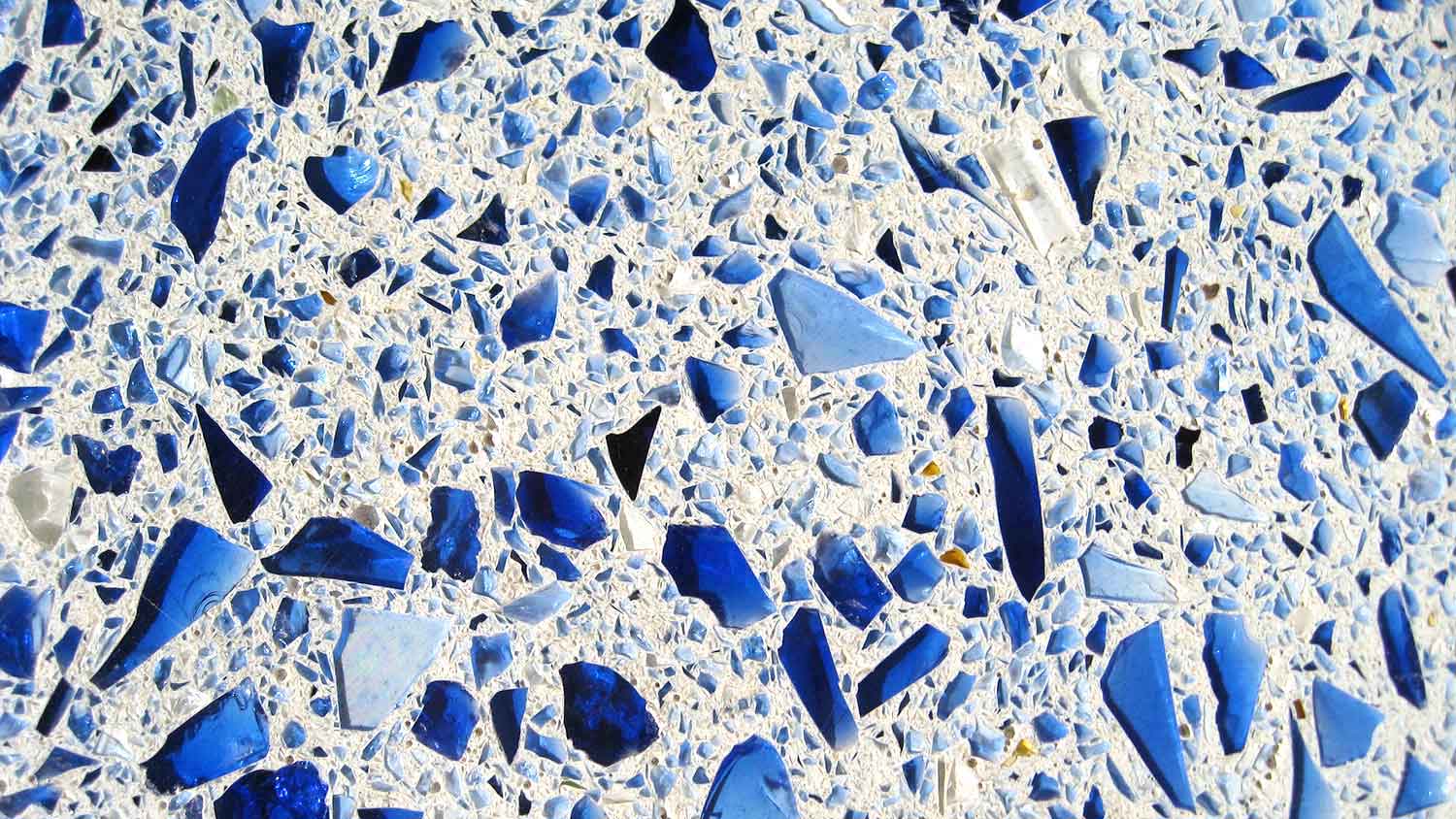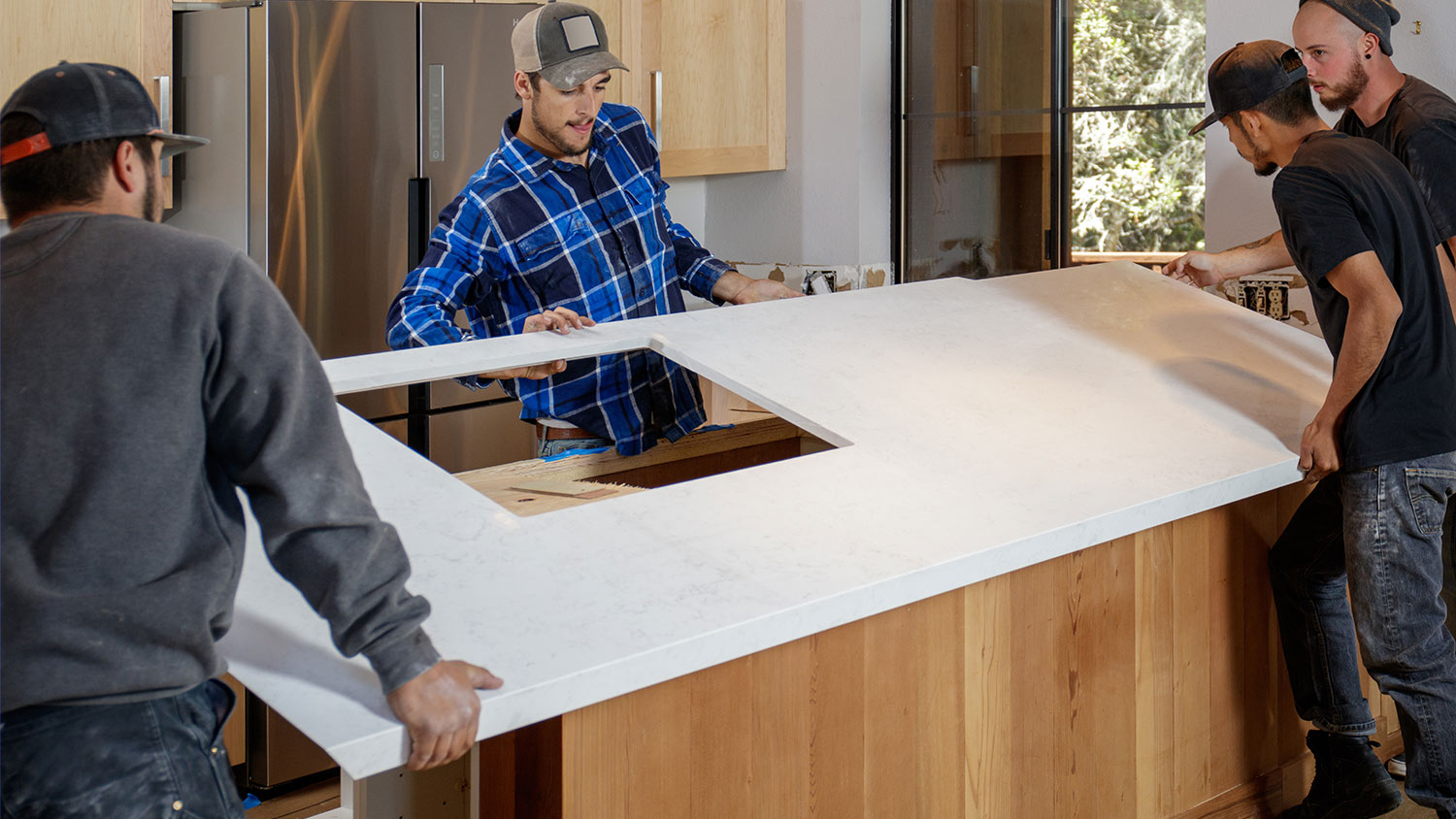
Kitchen islands are multipurpose workhorses in your kitchen. When looking to add one to your home, you should consider its size, materials, and its primary use in your home. Learn about the price of kitchen islands and their different features.
You can count on recycled glass for your kitchen countertops


Recycled glass countertops use discarded glass and a binding agent to make durable slabs for kitchens and bathrooms.
This countertop material is sustainable, durable, and highly unique.
Recycled glass can be costly to install and hard to repair, especially if it’s cracked or chipped by a heavy object.
Your kitchen or bathroom countertops will be with you for many years, so choosing the right material is essential. If you’re considering recycled glass countertops, you might wonder whether they’re the best option or whether you should choose something else. This guide explains what recycled countertops are and explores their pros and cons so you can make an informed decision.
Recycled glass countertops are made from repurposed glass sourced from old bottles, jars, windows, and other glass objects. The glass is crushed, combined with a binding agent (often concrete, resin, acrylic, or epoxy), and made into a slab for a kitchen or bathroom. Many homeowners choose recycled glass countertops for their sustainability and durability, while others like how the unique material looks in their homes. A local countertop contractor can use recycled glass countertops to give your kitchen a new, refreshed look that will last for years.

There are several pros and cons of recycled glass countertops to consider before deciding whether this material is right for you.
| Pros | Cons |
|---|---|
| Sustainability | High cost |
| Durability | Difficult to repair |
| Unique design | Prone to cracks and chips |
| Nonporous |
Recycled glass is a sustainable countertop material. Glass waste can take many years to decompose, so reusing it to make unique countertops helps keep that waste out of landfills. Recycled glass is also durable and naturally nonporous, making it a low-maintenance countertop material resistant to stains, high heat, and UV light. And because the material is made from pieces of glass, it can have a mosaic-like effect, giving it a similar look to terrazzo, which looks much more unique than other countertop materials.
If you have a small budget, recycled glass countertops might not work. Recycled glass is expensive compared to cheaper materials like laminate or tile. And, although highly durable, recycled glass countertops aren’t immune to damage. They are prone to cracks and chips, especially around the edges, if you place heavy objects or accidentally drop something on them. This damage can be difficult to repair—not to mention the high countertop repair costs—and you might need to replace the entire slab.
Budget is one of the most significant considerations when choosing a countertop material for your kitchen or bathroom. Recycled glass countertops cost $1,950 to $8,400 to install, depending on their size. On average, expect to pay around $2,700 to install this type of countertop in your home. Cheaper options include ceramic or porcelain tile; however, recycled glass is comparable in cost to stone countertop materials like granite, marble, and quartz.
Although recycled glass is a sustainable and unique countertop option, you might consider alternative kitchen or bathroom remodel materials. Here’s how recycled glass compares to some other popular countertop materials.
Recycled glass and quartz are both manufactured countertop materials with binding agents such as resin, but the latter uses quartz minerals to make the engineered stone countertop surface. As human-made materials, recycled glass and quartz are highly durable and naturally nonporous, making them easy to clean and maintain. However, quartz countertops cost more than recycled glass, with an average price tag of $4,500.
Recycled glass and granite countertops are high-end, durable options, but their differences outweigh their similarities. Granite is a natural material mined from quarries and cut into polished slabs for use in a kitchen or bathroom. It’s incredibly heat resistant but requires regular sealing to protect it from moisture damage. Recycled glass countertops are entirely human-made and can be produced in varying designs. This material usually doesn’t require sealing, though it might if the countertop contains concrete as the binding agent. Granite is a notably less sustainable material due to its quarrying.
From average costs to expert advice, get all the answers you need to get your job done.

Kitchen islands are multipurpose workhorses in your kitchen. When looking to add one to your home, you should consider its size, materials, and its primary use in your home. Learn about the price of kitchen islands and their different features.

Discover cabinet installation cost estimates, including average prices, key cost factors, and tips to save on your new kitchen or bathroom cabinets.

If you’re looking to refinish your countertops, epoxy will make them shine for years to come. This guide will help you budget for epoxy countertop costs.

Both quartz and marble countertops have their merit, but it’s important to know which one is right for your needs before committing to one over the other.

There are many things homeowners need to know about the battle between Corian vs. quartz countertops. We share the pros and cons of each surface.

Solve scratched countertops in as little as a weekend with this DIY guide on how to resurface countertops. It’s so easy even beginners can do it.